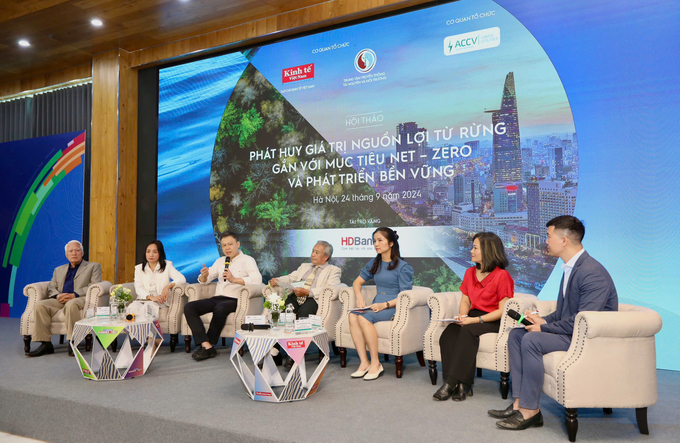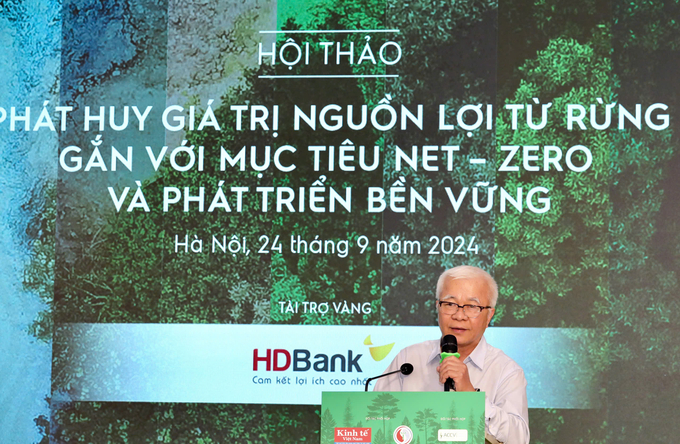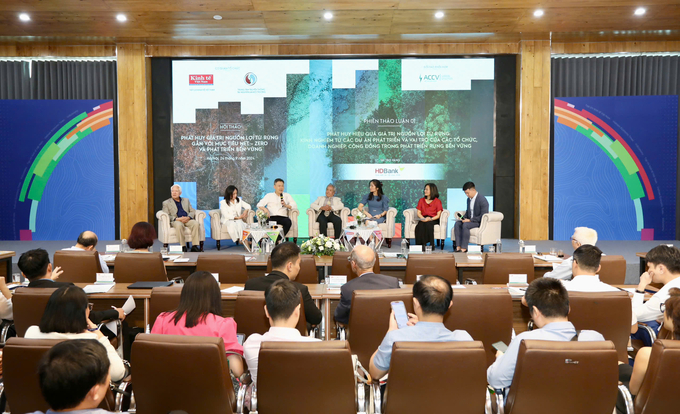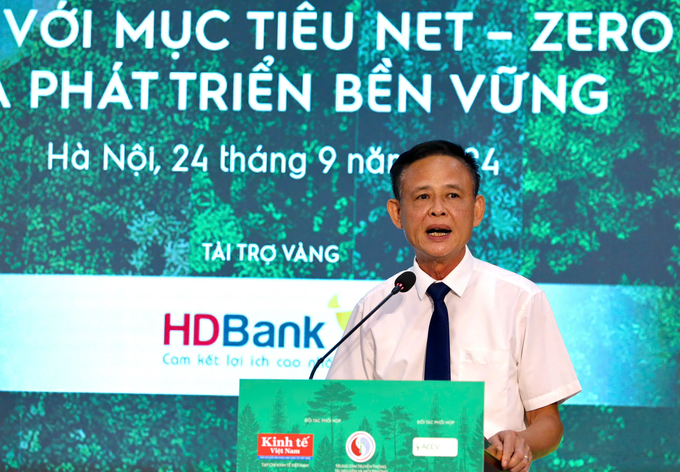May 20, 2025 | 14:43 GMT +7
May 20, 2025 | 14:43 GMT +7
Hotline: 0913.378.918
May 20, 2025 | 14:43 GMT +7
Hotline: 0913.378.918

Seminar "Promoting the value of forest resources associated with the Net Zero goal and sustainable development".
On the afternoon of September 24, the Seminar 'Promoting the value of forest resources associated with the Net Zero target and sustainable development' was held to aim for the Net Zero target by 2050.
Forest protection is a key task for Vietnam to achieve Net Zero by 2050 in the context of deforestation, natural forest degradation, and ineffective management of production forests, which are the causes of natural resource depletion and increased greenhouse gas emissions.
Vietnam aims to maintain a stable national forest cover rate of 42% to 43%, plant about 238,000 hectares of forest each year, and find ways to restore natural forests to combat climate change.

Dr. Chu Van Lam, Permanent Vice President of Vietnam Economic Science Association, Editor-in-Chief of Vietnam Economic Magazine.
Speaking at the opening of the workshop, Dr. Chu Van Lam, Permanent Vice President of the Vietnam Economic Science Association, Editor-in-Chief of Vietnam Economic Magazine emphasized: "We are all very aware that forests are valuable resources, forests have great value and are expressed through four prominent aspects: economy, environment, culture and irrigation".
Currently, developing multi-value forests is a trend that Vietnam is promoting. Accordingly, the direct values from wood, non-timber forest products, and hydropower only account for 15% of the value of the forest ecosystem. Other major benefits from forests are non-forest products and services. In particular, developing the forest carbon market is one of the current key tasks. This is clearly shown in the Project on developing multi-use values of forest ecosystems to 2030, with a vision to 2050, approved by the Government in early 2024.
“The values of forest resources need to be exploited and promoted more effectively and sustainably to meet new requirements and towards the carbon neutrality goals that Vietnam has committed to. We expect that with the participation of relevant Departments, Divisions, as well as relevant Ministries, experts, and investors, the issues raised at today's workshop will be clarified, bringing valuable information to all parties”, Dr. Chu Van Lam expressed.

Forest protection is a key task for Vietnam to realize its goal of achieving Net Zero by 2050.
At the seminar, Dr. Ha Cong Tuan, former Permanent Deputy Minister of Agriculture and Rural Development, Chairman of the Vietnam Association of Agricultural Economics and Rural Development, said: “Under the direction of the Government, the Ministry of Agriculture and Rural Development is actively innovating to continue restructuring the sector to achieve the goal of developing forests in particular and developing agriculture in general in the direction of multi-value. In particular, we must use non-forest values to prevent forest degradation and loss wisely”. Dr. Ha Cong Tuan assessed the potential to increase forest quality in Vietnam. Vietnam's current task is to increase forest quality to increase carbon storage. Because different forest quality will lead to different carbon storage capacities (known as "carbon storage"). The ability to absorb and store a forest's carbon depends on factors such as biomass richness, tree species, forest age, and conservation status.

Dr. Ha Cong Tuan, former Permanent Deputy Minister of Agriculture and Rural Development, Chairman of the Vietnam Association of Agricultural Economics and Rural Development, spoke at the Seminar.
In addition, Vietnam needs to assess factors affecting carbon credit prices, such as the type of project that forms the carbon credit and determining the daily increase in emissions based on the criteria and payment location. Dr. Ha Cong Tuan added that at some carbon credit sales points in Europe, the price of carbon credits also includes the cost of conserving species living in that area. This creates a sustainable model for reducing greenhouse gas emissions while preserving biodiversity and protecting the environment.
In addition, Vietnam should consider establishing a mandatory carbon trading platfrom to fulfill its international commitment to reduce greenhouse gas emissions and achieve the Net Zero target by 2050. The trading platfrom will encourage businesses to participate in environmental protection activities, generate income from carbon credits and ensure transparency in measuring emissions. In addition, establishing a platfrom also creates opportunities for Vietnam to participate in the international carbon market, learn from the experiences of developed countries, and raise public awareness of environmental protection.
Translated by Huong Giang

(VAN) In 2024, over 295 million people across 53 countries and territories faced acute hunger—an increase of almost 14 million people compared to 2023, while the number of people facing catastrophic levels of hunger reached a record high.

(VAN) World Environment Day 2025 (June 5) carries the theme 'Beat Plastic Pollution' continuing to emphasize the global urgency of addressing the plastic waste crisis.

(VAN) This was the assessment shared by experts at the workshop titled 'Assessing the Role and Potential of Low-Emission Rice Production Systems in Vietnam,' held on the morning of May 19.

(VAN) Cai Rong Port is the fisheries control center of Quang Ninh, helping to monitor fishing vessels, combat IUU fishing, and remove the EC's 'yellow card'.

(VAN) The German Agricultural Society (DLG) explores the possibility of establishing a mechanization service center in Vietnam’s Mekong Delta to support farmers in accessing and utilizing advanced machinery.

(VAN) On May 16, the Department of Water Resources Management, in collaboration with the Food and Agriculture Organization of the United Nations (FAO), held a signing ceremony for the GEF-8 project document.

(VAN) Food safety, mechanization, vocational training, and market opening are key areas of cooperation expected between the Vietnamese Government and the Federal Republic of Germany.